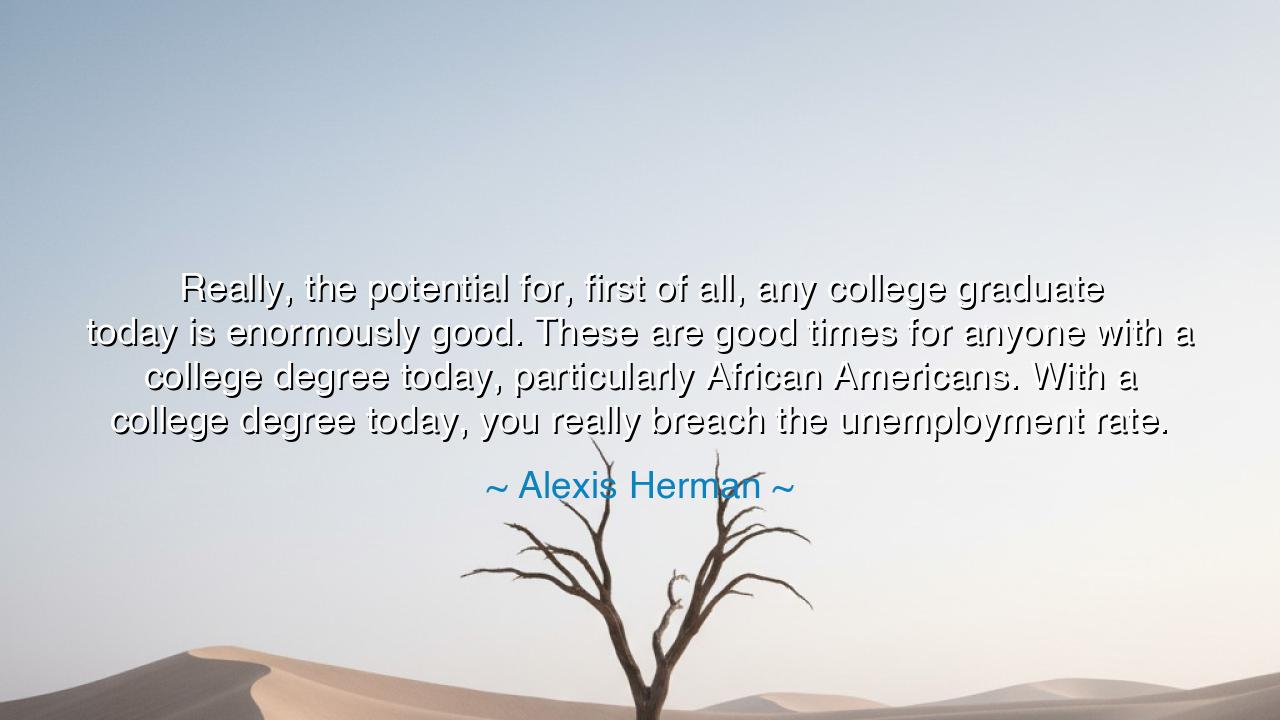
Really, the potential for, first of all, any college graduate
Really, the potential for, first of all, any college graduate today is enormously good. These are good times for anyone with a college degree today, particularly African Americans. With a college degree today, you really breach the unemployment rate.






The words “Really, the potential for, first of all, any college graduate today is enormously good. These are good times for anyone with a college degree today, particularly African Americans. With a college degree today, you really breach the unemployment rate” spoken by Alexis Herman ring with both optimism and the weight of historical progress. Beneath their conversational phrasing lies a profound truth about education as empowerment, opportunity as equity, and knowledge as the key to social mobility. Herman, a trailblazing figure in government and labor advocacy, speaks not merely about statistics, but about the transformative power a college degree holds in opening doors and challenging barriers, particularly for groups historically denied access.
In the style of the ancients, one could hear echoes of Cicero and Aristotle, who saw education as the foundation of both personal excellence and civic contribution. Herman’s statement emphasizes that the college graduate does not merely possess knowledge, but also the tools to navigate the labyrinth of opportunity, to rise above limitations, and to exert influence in a world that often tests the unprepared. She highlights that these are not abstract promises; rather, a degree provides tangible leverage, enabling one to breach obstacles such as unemployment, systemic discrimination, and social stagnation.
The origin of this insight lies in Herman’s experience as a leader who has witnessed the evolving landscape of labor, education, and social equity in the United States. She recognizes the correlation between education and opportunity — that in modern society, the completion of higher learning often translates directly into access, stability, and the ability to enact one’s ambitions. For African Americans and other marginalized communities, a college degree represents not only personal advancement but a breach of historical barriers, a claim to a space long denied. Herman’s words are both celebratory and aspirational, affirming the practical and symbolic power of education.
History offers numerous examples of this principle in action. Thurgood Marshall, before becoming the first African American Supreme Court Justice, leveraged his education at Howard University Law School to challenge systemic injustice and reshape the legal landscape. Likewise, Madam C.J. Walker, though not formally a college graduate, cultivated knowledge, skill, and entrepreneurship to become the first self-made female millionaire in America. Herman’s statement resonates in this tradition: knowledge equips the individual to transcend societal constraints and seize opportunity.
Her words also carry a motivational charge: she urges graduates to recognize their own potential and the power inherent in their achievement. A college degree is not simply a credential; it is a springboard, a tool to claim influence in the workplace, in civic life, and in society at large. By emphasizing that graduates “breach the unemployment rate,” Herman underscores the economic security and agency that accompany education, reminding us that knowledge is both protective and enabling.
Dear listener, the lesson is timeless: education is empowerment, and opportunity follows preparation. To earn a degree is to acquire not just facts or techniques, but the ability to navigate complexity, to innovate, and to participate meaningfully in society. Those who hold this advantage bear a responsibility: to apply it wisely, to lift others as they rise, and to engage in the ongoing work of equity and justice. Herman’s words call us to action, reminding graduates that potential is realized through effort, courage, and purpose.
Take this wisdom into your own life: cultivate your skills, seek knowledge relentlessly, and understand the doors your education opens. Recognize the historical struggles that make your achievement possible, and honor them by striving not only for personal success but also for the empowerment of your community. A degree is not the endpoint, but the key to unlock further growth, opportunity, and impact.
Finally, let Alexis Herman’s words guide generations: relish the potential, seize the opportunities, and breach the barriers before you. Education equips the mind, steadies the hand, and strengthens the resolve. It is both shield and sword, granting the power to navigate a changing world, and the courage to shape it. By honoring the gift of learning, graduates become architects of their own destiny and stewards of the collective future.






AAdministratorAdministrator
Welcome, honored guests. Please leave a comment, we will respond soon